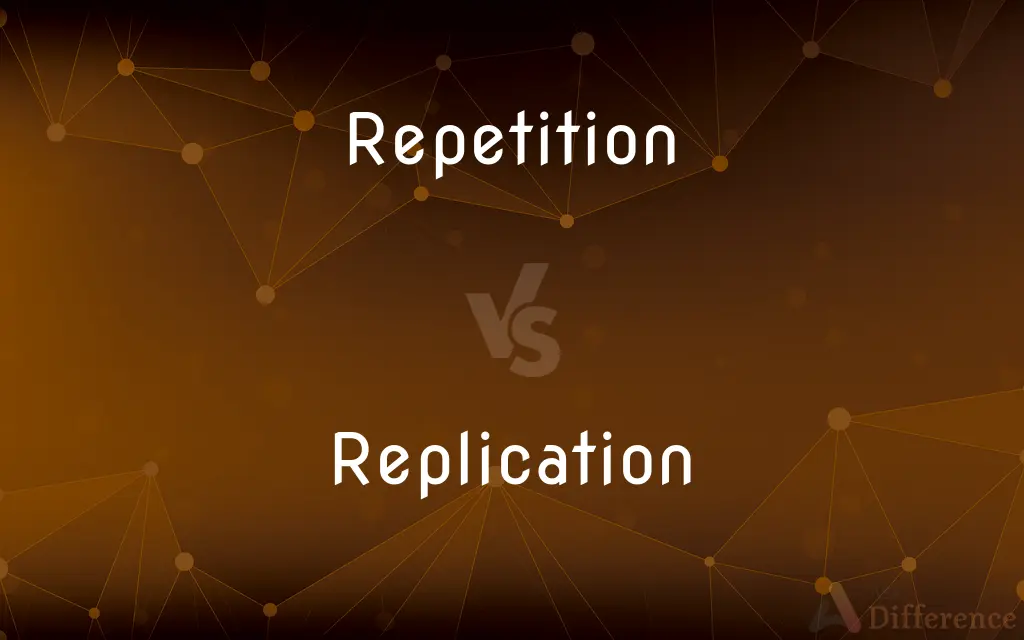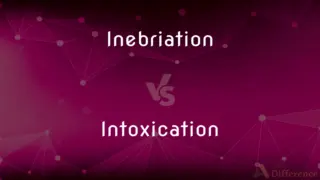Repetition vs. Replication — What's the Difference?
Edited by Tayyaba Rehman — By Maham Liaqat — Updated on March 25, 2024
Repetition focuses on duplicating processes to ensure reliability, while replication verifies results in different settings for validation.

Difference Between Repetition and Replication
Table of Contents
ADVERTISEMENT
Key Differences
Repetition involves performing the same experiment or process multiple times to check for consistency in the results. This is crucial in scientific studies where the reliability of findings is paramount. On the other hand, replication involves conducting the experiment or process under different conditions or settings to validate the original findings. It helps in confirming the universality and applicability of the results.
While repetition emphasizes the reliability and stability of outcomes within the same framework or conditions, replication tests the external validity and generalizability of the results. Replication thus serves as a broader validation mechanism in scientific research and experimentation.
Repetition is often used within the same study to ensure that the observed effects are not due to random chance or experimental errors. Whereas, replication can be seen as a subsequent step, where independent researchers attempt to reproduce the findings to confirm their accuracy and applicability in broader contexts.
In the context of data analysis, repetition might involve re-running the same statistical analyses multiple times to check for consistency in the data processing steps. In contrast, replication might involve using the data to test the findings in a different dataset or applying the same methodology to a different set of data to ensure the conclusions are not specific to the original data set.
Repetition strengthens the internal validity of research by demonstrating consistency in results under the same conditions. Replication, however, enhances the credibility and robustness of research findings by proving their applicability across different conditions and settings.
ADVERTISEMENT
Comparison Chart
Purpose
Ensures reliability and consistency of results.
Validates results across different settings.
Focus
Consistency and stability within the same framework.
External validity and generalizability.
Used by
Same researchers within a study.
Independent researchers in subsequent studies.
In Data Analysis
Re-running statistical analyses for consistency.
Applying methodology to different datasets.
Enhances
Internal validity.
Credibility and applicability of findings.
Compare with Definitions
Repetition
The act of doing or performing something again.
The repetition of the experiment confirmed the initial results.
Replication
In biology, the process of DNA duplication before cell division.
DNA replication is crucial for genetic inheritance.
Repetition
In literature, the use of the same word or phrase multiple times for emphasis.
The poet's repetition of the word darkness underscored the theme of despair.
Replication
In computing, the act of duplicating data across systems for backup or scaling.
Data replication ensures that the system remains operational even after a hardware failure.
Repetition
In music, playing or singing a section again.
The repetition of the chorus added to the song's catchiness.
Replication
In manufacturing, producing an exact copy of a product.
The replication of the antique vase was so precise that it was hard to tell from the original.
Repetition
In sports, performing an action or drill multiple times to improve skill.
Repetition of the drill improved the players' coordination.
Replication
In art, the process of recreating an existing artwork.
The artist's replication of the famous painting was commendable for its accuracy.
Repetition
In learning, the technique of reviewing material multiple times to aid memorization.
Through repetition, the students memorized the historical dates.
Replication
The process of duplicating a study to verify its findings.
The replication of the study in a different country provided more evidence for the theory.
Repetition
The act or process or an instance of repeating or being repeated.
Replication
The act or process of replicating something.
Repetition
A recitation or recital, especially of prepared or memorized material.
Replication
(Biology) The process by which genetic material, a single-celled organism, or a virus reproduces or makes a copy of itself.
Repetition
The act or an instance of repeating or being repeated.
Replication
In scientific research, the repetition of an experiment to confirm findings or to ensure accuracy.
Repetition
(weightlifting): The act of performing a single, controlled exercise motion. A group of repetitions is a set.
Replication
A copy or reproduction
A replication of a famous painting.
Repetition
To petition again.
Replication
(Law) The plaintiff's response to the defendant's answer or plea; a reply.
Repetition
The act of repeating; a doing or saying again; iteration.
I need not be barren of accusations; he hath faults, with surplus to tire in repetition.
Replication
The process by which an object, person, place or idea may be copied mimicked or reproduced.
Repetition
Recital from memory; rehearsal.
Replication
Copy; reproduction.
That painting is an almost exact replication of a famous Rembrandt painting.
Repetition
The act of repeating, singing, or playing, the same piece or part a second time; reiteration of a note.
Replication
(legal) A response from the plaintiff to the defendant's plea.
Repetition
Reiteration, or repeating the same word, or the same sense in different words, for the purpose of making a deeper impression on the audience.
Replication
(biology) The process of producing replicas of DNA or RNA molecules.
Repetition
The measurement of an angle by successive observations with a repeating instrument.
Replication
(computing) The process of frequent electronic data copying a one database in one computer or server to a database in another so that all users share the same level of information. Used to improve fault tolerance of the system.
Repetition
An event that repeats;
The events today were a repeat of yesterday's
Replication
An answer; a reply.
Withouten any repplicacioun.
Repetition
The act of doing or performing again
Replication
The reply of the plaintiff, in matters of fact, to the defendant's plea.
Repetition
The repeated use of the same word or word pattern as a rhetorical device
Replication
Return or repercussion, as of sound; echo.
To hear the replication of your sounds.
Replication
A repetition; a copy.
Replication
The copying, by enzymes, of a cell's genome, i.e. the DNA or RNA comprising its genetic material, so as to form an identical genome. This is an essential step in the division of one cell into two. This differs from transcription, which is the copying of only part of the genetic information of a cell's genome into RNA, as in the processes of biosynthesis of messenger RNA or ribosomal RNA.
Replication
The act of making copies;
Gutenberg's reproduction of holy texts was far more efficient
Replication
(genetics) the process whereby DNA makes a copy of itself before cell division
Replication
A quick reply to a question or remark (especially a witty or critical one);
It brought a sharp rejoinder from the teacher
Replication
(law) a pleading made by a plaintiff in reply to the defendant's plea or answer
Replication
The persistence of a sound after its source has stopped
Replication
Copy that is not the original; something that has been copied
Replication
The repetition of an experiment in order to test the validity of its conclusion;
Scientists will not believe an experimental result until they have seen at least one replication
Common Curiosities
What is the main purpose of repetition in scientific research?
To ensure reliability and consistency of results by performing the same experiment multiple times.
Can repetition and replication be used together in research?
Yes, both can be used together to ensure the reliability and broader applicability of findings.
How does replication differ from repetition in its objectives?
Replication seeks to validate results across different settings, enhancing their credibility and generalizability.
Why is replication important in the scientific community?
It validates findings in varied conditions, confirming their accuracy and universality.
What role does replication play in enhancing research findings?
It broadens the applicability and credibility of the findings by testing them in different settings.
How does replication contribute to the scientific method?
By allowing independent verification of results, it is a cornerstone of the scientific method.
Can replication be performed by the same researchers who did the original study?
While possible, it's more common and credible when done by independent researchers.
What challenges are associated with replication in research?
Challenges include variations in methodologies, contexts, and experimental conditions.
Why might replication fail to produce the same results as the original study?
Due to differences in experimental conditions, populations, or methodologies.
How does repetition benefit data analysis?
It ensures consistency in statistical analyses and strengthens the internal validity of the research.
Is repetition only applicable within the same study?
Typically, yes, to verify consistency of the results under the same conditions.
Can replication influence research trends in academic fields?
Yes, successful replications can validate and strengthen research trends, while failures can prompt reevaluations.
How do repetition and replication interact in the process of scientific discovery?
Together, they strengthen the scientific process by ensuring reliability and validating findings across different contexts.
How do replication efforts benefit the academic community?
They ensure that research findings are robust, reliable, and applicable across various contexts.
Does repetition guarantee the accuracy of research findings?
It increases confidence in the reliability of findings but doesn't guarantee accuracy.
Share Your Discovery

Previous Comparison
Weary vs. Wary
Next Comparison
Inebriation vs. IntoxicationAuthor Spotlight
Written by
Maham LiaqatEdited by
Tayyaba RehmanTayyaba Rehman is a distinguished writer, currently serving as a primary contributor to askdifference.com. As a researcher in semantics and etymology, Tayyaba's passion for the complexity of languages and their distinctions has found a perfect home on the platform. Tayyaba delves into the intricacies of language, distinguishing between commonly confused words and phrases, thereby providing clarity for readers worldwide.
















































